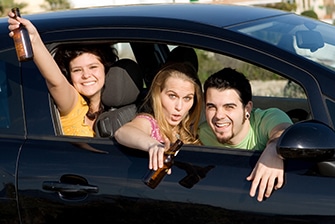Alcohol Abuse by Teenagers
Alcohol is the drug of choice for most teenagers and can lead to severe consequences. Alcohol abuse by teenagers not only affects the young people who are drinking, but also impacts the safety of the people they encounter. Luckily, there are signs to look out for, ways to prevent alcohol abuse by teenagers and ways to get help.
Stats on Alcohol Abuse by Teenagers
Alcohol is the most commonly used and abused drug among youth in the United States, making it a very large problem. Here are some statistics on alcohol abuse by teenagers, provided by the CDC.
- Excessive drinking is responsible for more than 4,300 deaths among underage youth each year, and cost the U.S. $24 billion in economic costs in 2010.
- Although the purchase of alcohol by persons under the age of 21 is illegal, people aged 12 to 20 years drink 11% of all alcohol consumed in the United States.4 More than 90% of this alcohol is consumed in the form of binge drinks.
- On average, underage drinkers consume more drinks per drinking occasion than adult drinkers.
- In 2013, there were approximately 119,000 emergency room visits by persons aged 12 to 21 for injuries and other conditions linked to alcohol.
- In 2016, the National Survey on Drug Use and Health reported that 19% of youth aged 12 to 20 years drink alcohol and 12% reported binge drinking in the past 30 days.
- In 2017, the Monitoring the Future Survey reported that 8% of 8th graders and 33% of 12th graders drank during the past 30 days, and 2% of 8th graders and 19% of 12th graders binge drank during the past 30 days.
Effects on Teenagers
Alcohol abuse by teenagers can cause life-long, damaging consequences. Some of these include:
- Issues at school. A teenager who abuses alcohol will have more absences and lower grades than one who does not. In addition, alcohol abuse could lead to a student being expelled from school or derailing them from attending the college of their choice.
- Social problems. Teens who abuse alcohol may engage in more fighting and spend time with untrustworthy individuals. They may isolate themselves in favor of their new social circle and not participate in appropriate social activities.
- Legal issues. Teens may be arrested for driving under the influence, fighting, public intoxication, underage drinking or more due to their lowered inhibitions.
- Physical effects. Underage drinking can stunt normal growth patterns, sexual development, and brain development. Some of these issues can include memory problems, social problems, and problems forming relationships.
- Becoming a high risk. Teenagers who abuse alcohol find themselves to be high-risk for different issues such as physical or sexual assault, unplanned pregnancy, suicide, homicide, injury, car crashes, burns, falls, drowning, abusing other drugs, suffering a lifetime of addiction and more.
Signs to Look Out For
There are many reasons a teenager may choose to drink alcohol, whether it is due to peer pressure or learned behavior. Whatever the reason may be, there are a few tell-tale signs to look out for to determine whether a teenager has been abusing alcohol.
- Frequently spending the night away from home could be a sign of alcohol abuse, The teenager may have found a “safe” place to drink alcohol and hide while under the influence.
- Behavioral changes such as irritability, aggression, lying, breaking curfew, or rebelling against his or her parents are all signs that something is amiss.
- Problems at school such as low grades, detentions, a new social circle, unexplained truancy and teachers expressing concern should all be paid attention to.
- Frequently telling you they have the flu or feel sick in order to disguise a hangover or regularly having an unkempt appearance should not be ignored.
How to Prevent Alcohol Abuse by Teenagers
It can be difficult to stop alcohol abuse by teenagers once it has occurred, but there are many ways to help prevent it.
As a parent, make sure you spend time speaking with your child about the dangers of alcohol abuse, your expectations, and what to do in the event of peer pressure. Keeping this open line of communication will help your child feel more comfortable telling you if peer pressure is occurring or if they are interested in trying alcohol.
Substance use in teenagers occurs most often between the hours of 3 p.m. and 6 p.m. This makes teen supervision important, so make sure you are available to your child or they take part in extracurricular activities after school. Not only will extracurricular activities help keep them out of trouble, but they will also be with likeminded friends and keep stress levels low.
About Cliffside Malibu
Alcohol abuse by teenagers is a huge issue that can lead to addiction and abuse of other substances. If you feel as if your teenager may be abusing alcohol, it is important to get help right away. It will not only save their life but will help prevent more life-long consequences.
Since no two addictions are the same, Cliffside Malibu offers an individualized treatment plan for every client. We are committed to providing evidence-based treatment through a continuum of care model including medically supervised detox, residential treatment, day treatment, and outpatient services. Our program also includes family therapy and holistic therapy, as well. Whether an individual is suffering from substance abuse and/or alcohol addiction, our programs are structured to create a supportive environment where healing can begin.
In addition to world-class treatment, Cliffside Malibu offers luxury accommodations, a serene environment, five-star dining, and plentiful amenities. We understand that addiction treatment is a rigorous process. Therefore, we provide for your comfort and relaxation at every turn, allowing you to rejuvenate, and meet the demands of treatment with your greatest energy and attention.
For more information on Cliffside Malibu, visit cliffsidemalibu.com
